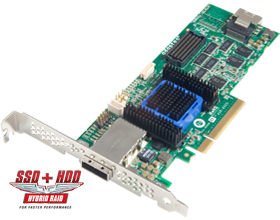 MICROCHIP TECHNOLOGY Raid Controller And Hba 6445 - SATA And Sas/ 512MB Md2 Low Profile/ 8-lane Pci-e/ Single
MICROCHIP TECHNOLOGY Raid Controller And Hba 6445 - SATA And Sas/ 512MB Md2 Low Profile/ 8-lane Pci-e/ Single
For personal help or faster delivery
+32 2 558 30 00
The 6Gb/s Series 6 family of Unified Serial controllers offers superior bandwidth and full cache protection without battery installation, monitoring, or replacement costs
8 port (4 internal/4 external), low profile, SAS 2.O and Gen 2 PCI-Express (PCIe) Unified Serial RAID controller with Zero-Maintenance Cache Protection and Intelligent Power Management delivers exceptional performance, advanced data protection, maximum scalability and the lowest total cost of ownership for enterprise-class, high-density server applications.
The Series 6 family of high-performance Adaptec Unified Serial® (SATA/SAS) RAID controllers offers maximum performance, scalability and flexibility. With the enhanced bandwidth of its 6 Gb/s SAS2.0 interfaces and the PCIe Gen2 host connection it offers up to 60% higher sustained sequential throughput than previous generation controllers
Based on PMC-Sierra's market-leading, multi-core SRC 8x6G RAID-on-Chip (RoC) the Adaptec RAID 6805 can deliver up to 2 GB/s sustained data transfer rate to the host. Peak performance is up to 4.8GB/s through the SAS 2.0 interfaces and 4.0GB/s through the PCIe Gen2 host interface. Using SAS expanders, it can connect up to 256 SATA/SAS.
The Adaptec RAID 6445 supports a broad range of operating systems, compatibility with more than 300 third-party devices, and full integration with Adaptec Storage Manager™ for centralized management of all Adaptec RAID controllers on the network.
Zero-Maintenance Cache Protection Kit Option – Maximum protection and Savings
Adaptec Series-6 is the industry's first Unified Serial RAID controller which offers Zero-Maintenance Cache Protection that eliminates Battery backup Units (BBUs) in favor of 4GB of NAND flash memory to protect cached data and eliminate the installation, monitoring, maintenance, disposal and replacement costs associated with BBUs. Available as a separate Kit: Adaptec Flash Module 600.
Intelligent Power Management - Reduce Power by up to 70%
Adaptec Intelligent Power Management slashes storage power and cooling costs by spinning down idle disks and providing a lower power mode for active disks.
Results 0
| 5 | ☆ | |
| 4 | ☆ | |
| 3 | ☆ | |
| 2 | ☆ | |
| 1 | ☆ |
- User Reviews (12)
- Write Review
- Questions and Answers
- Ask Question

















 FREE Shipping.
FREE Shipping.

